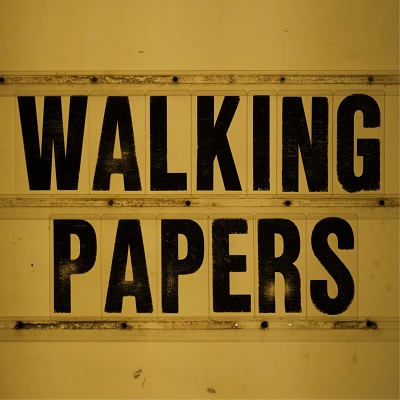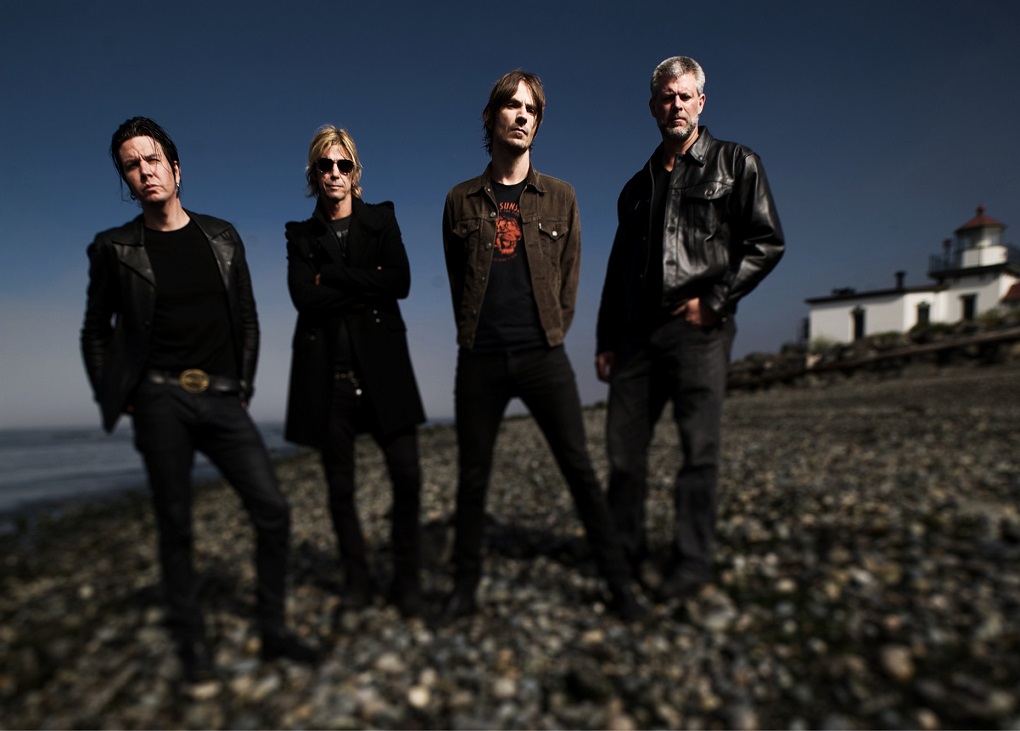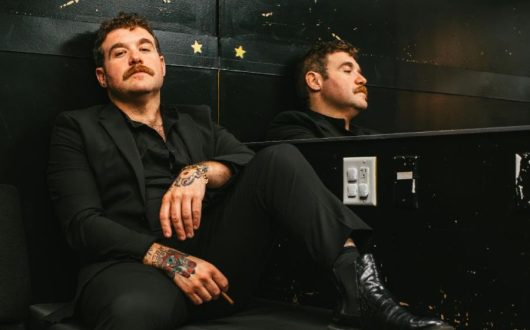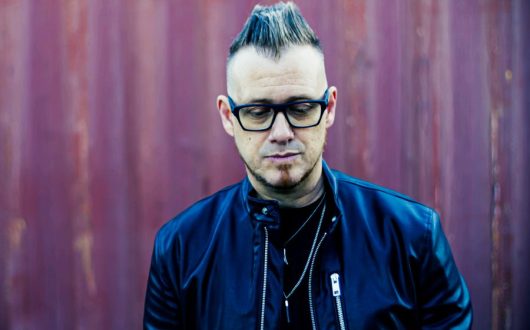Interviewed by: Adrian Hextall
Put up or shut up. It’s a mantra many rock bands of today tend to give great lip service to, but often fail to deliver the goods to back up their lofty claims. The hard-rocking Seattle quartet Walking Papers knows exactly how to forge the sounds that back up everything they want to be as a vibrant creative entity.
Indeed, Walking Papers have upped the sonic ante with the lucky 13 tracks put forth on their aptly dubbed second album WP2. The four musicians front man Jeff Angell, drummer Barrett Martin, bassist Duff McKagen and keyboard player Benjamin Anderson have once again deployed the in-sync production handiwork of mixmasters Jack Endino (Soundgarden, Nirvana, Mudhoney) and Martin Feveyear (Mark Lanegan, Kings of Leon, Queens of the Stone Age), and mastered by Chris Hanzsek, WP2 builds on the promising template of the band’s self-titled 2013 debut, which featured deeply impactful tracks like “The Whole World’s Watching” and “Capital T.”
We caught up with frontman Jeff Angell on a cross Atlantic phone call. As well as a new album, the question about live shows naturally arises as the band have a great stage reputation. Something the UK needs to experience again.
AH: It’s actually been quite some time since I’ve last managed to see you in the band live. It was actually 2013, I think, when I managed to see you play. You were over in Helsinki, at the Circus Club as part of the Rock the Beach Festival.
JA: Yeah. Duff didn’t make it to that one, did he?
AH: That’s right. It was just I think the three of you on stage, wasn’t it?
JA: Yeah. The keyboard player, Ben Anderson, had to pick up the bass lines with his left hand. He had about two days to learn all the songs. We played one show before that in Bilbao, Spain or Basque Country. The day before, he played to I think 20,000 people and had never played the songs before, and he had to do both his part and the bass parts. It’s pretty awesome.
AH: That’s pretty cool if you can at least pull that off which obviously he did because the following show in Helsinki, you’d never know. I mean, it just felt a very natural thing for the three of you to put on.
JA: Well, thank you. He did a good job and he worked his magic.
AH: Some four years later we have then, a new album in the works. An interesting one as well because it’s got a different feel to it. Your voice feels different as well. Is there something in that? Would you say it’s a different performance that you are putting into this one or is it just where you’re coming from these days?
JA: I don’t know. I mean, I think that as we made the first record and then Ben and Duff joined, after the record, it was me. When we made the record, we’ve never played a live show before. I think with touring, we’ve definitely kind of found out the band that we could be and then we acquired a couple more limbs I supposed to where we can kind of found out what we might be able to do with people covering the different parts and stuff. And then we kind of expanded on doing some harmonies and things like that. But I think vocally, I was kind of trying to see–You learn more about songwriting and how to build with songs. And sometimes, you also get tired of kind of painting with the same color all the time and you want to see if you can maybe try some different ranges out.
We’ve also tuned some of the guitars differently in order to accommodate the vocal, finding some different intervals and that kind of thing. Hopefully, you’re constantly growing. And if you’re not growing, at least you’re trying. Trial by error. Trial by fire. Maybe you try some things and they don’t work and you just continue to have fun trying, I suppose. It gets kind of boring if we’re just stuck at the same formula as I would think.
AH: Very true. I mean, I can hear elements of other artists in what you’re doing this time as well. There were times as I was listening to the new album that I’m thinking, you know what, I can hear a little bit of Jim Morrison in there. I’m sure there’s a Doors influence in your career anyway, to a degree. But certainly, you seem to be bringing a bit of your inner Jim out at times. And a really odd one I can hear a little bit of, say, Bono in your voice as well, which made me smile because some people will take that as a positive thing and others a negative.
JA: Actually, if you’re a guy and you’re 12 or 13 years old, Jim Morrison, he’s kind of the archetype for every rebellious kid, of growing out of being a teenager and growing through a rebellious period and becoming a young man. I think those records are great for that. As a singer, it’s also kind of like Singer 101.
And then on the other hand, he’s also one of the first singers to kind of make lyrics considered as valid poetry rather than just attuned to sing along to. You know what I mean? So I think on all those levels, he’s really important. Most of the stuff he’s going to get for us for drinking and causing riots. But then, sometimes, people are overlooking the excellent art. You know what I mean? Their band to me isn’t a rock band, it’s an art band. It’s beyond just rock and roll. I think that that’s about as high as you can achieve.
And then Bono I think is pretty important to me personally. I’m not a big fan of anything he’s done in a really long time. They haven’t done much for me. But when I was a kid, I was kind of like a little heavy metal kid. U2 kind of bridged the gap. That kind of opened my mind to more college rock and that kind of stuff, when I was probably like 11 or 12 years old. When they did Unforgettable Fire and Joshua Tree and stuff like that, when they started to kind of bring in some, it seemed like they were kind of obsessed with Americana or something.
I think that that’s when they do the work that inspired me. And then there’s some of this, your voice just sounds the way it sounds. I’m kind of a baritone. I’m probably a high baritone and same with both of those guys. So I’m going to fall into that range. I don’t have that Robert Plant screech. You know what I mean? I don’t have that. Or the super low bass thing like some of these people. So it’s like you kind of fall into the range. You got a tenor or an alto or the baritone and that’s just kind of my range. I’m kind of in the same level as those guys. Thank God because I prefer that to a high screech myself.
AH: You would anticipate if nothing else that it’s going to help extend your career as well because you can’t hit those high notes from the age of 20 up to the age 70, but you can potentially manage the baritone piece for a lot longer in the same period.
JA: Yeah, I do. With this kind of a tragic thing with the Chris Cornell thing, it’s up to you. As a singer, I kind of wonder if it might have been… Who knows? You can’t get into the psychology that if someone has a tragic end like that, it affects people. Everybody kind of sits around and goes, “Why? Why would you do that?” As a singer, in my own head, I was kind of like, man, I saw some of those last concerts and stuff and I would be like, “What would it be like to try to hit some of that Soundgarden stuff?” That early Soundgarden was like the highest range anyone’s ever had. And then all of a sudden, now, you’re 50 years old and to go out and know that you’re not able to do this thing that you used to be able to do, I kind of imagine there was some pressure from that, for sure. I mean, he’s one of the most amazing singers of all time. And then to be up there, and you can tell that your ability to do that, he kind of wrote it. He wrote a check that’s going to be real hard to cash for the rest of your life.
AH: Just going back to Morrison as well, you mentioned the poetry elements on the outside. Some of the lyrics that you got on the new album actually stopped me, as opposed to just listening to it, say, as an album on a musical basis. I got as far as Red & White, and then I stopped, and then I had to rewind it, and then I listened to the lyrics, and then rewound it and listen to them again and again and again. I mean, there are some really poignant moments in there and its lyrics that really speak out rather than they just being a song, if you know what I mean.
JA: Well, I appreciate that very much because that’s exactly what I’m trying to do. If a guy isn’t going further, if I was just playing rock and roll, I would have been bored at about 30. I continue with it because I think that it’s kind of a perfect art form in a lot of ways to kind of… You can say a lot in a four-minute song by what you leave to the imagination. You kind of really got to minimize it and you only have so much time to say something there and to try to put a complete a picture or create some epiphanies in people’s minds.
It’s challenging to do but I think when you do, it’s an amazing thing. I’ve heard this stuff about this writer who’s… I don’t remember if it’s Raymond Chandler or Raymond Carver or one of these guys. He was saying that his writing teacher had told him, “Here, write me a thing,” and he would write it with 50 words. And then he would come back and he goes, “No. Strip that down to 25 words.” And then he go back to 25 words and he come back and he’s like, “Can you say the same thing in 15 words?” And then he’s like, “No, I can’t.” He’s like, “Okay. Well, you’re done then.” I think that that’s, especially in this world where there are so much information that’s passing so fast, people, they’re so easily distracted. If you have someone for a moment, you have that moment, you really got to wind down what you’re saying to make it have an impact at that time.
Which of course I’m not doing very well with my speaking [laughs]. I have to organize these thoughts as we’re talking. But in a song, a guy can keep wheedling it down and keep cutting out stuff and so you get down to the fragments to where you’re really saying something in just a couple of verses. I mean, to me that’s the most fascinating thing about these music adventures.
AH: Certainly, where you say you’re narrowing it down as well, I mean, stand out. And that song specifically, the whole piece around how can we even get married if I can’t afford to pay the rent. That is so true for so many people in this day and age, isn’t it?
JA: Yeah. And it’s true for me too. The thing that’s great about that song, that particular line is the thing that started the whole deal. But I think that particular song… And I don’t even take credit for that. If I’m talking about the song that I wrote, it’s not necessarily that I’m sitting here patting myself on the back. I feel more like I’m the guy that happened to be walking through the forest with the machete and then I discovered the ruins of some awesome temple or something.
Writing songs is a lot more just keeping your ear to the ground and paying attention, and then wheedling out the bullshit. It’s a lot more about that than it is about some divine intervention. And so I think in that song, there’s that going on. There are challenges to that, but there’s also a woman inspiring the man to make a change in his life and him sitting on his hands and not knowing how is he going to do this, live this honorable life to make someone happy.
I think there is some of that going on in that song as well. And there’s also some stuff going on in that song about the past, kind of having its way with you. And even though that you get into a new step in your life, you’re still kind of haunted and damaged from everything that you lived through before that. All that is in that song, in that one song. To me, that song will be a treasure for me for the rest of my life. That I happened to be the guy that was fortunate enough to put that together in that one song.
AH: In four minutes as well, you’re effectively managing to inspire people which has to be an aim of any songwriter if that material can be used as an inspirational thought or a moment to somebody to actually do something about it.
JA: I hope so. And also, every time I sing it, my girlfriend’s charmed.
In another way too, that’s a song… Ben Anderson is one of my best friends in the world. The chord progression and the chorus, that was his thing, and so I was able to marry his musicality to my lyrics and melodies. And together, that was something that we did together that we can be proud of as an achievement that our time manifested.
AH: Definitely. The way it slows it right down, after the first couple of tracks on the album, that sort of makes you step back a little bit. And keyboard intro from Ben on Red & White before Barrett with that slow drum really kicks the song off well. It’s just a different approach. It stops you at the moments and then carry on again. You’ve got a very neat mix of those tracks on the album.
I understand that you and Barrett for example do work on these tracks and you bounce off ideas of each other, I like the comments about how … ‘There’s always a little bit of tension in the way sometimes these songs have progressed and how they come together’. But clearly, it’s the right source of tension that delivers a solid end result.
JA: Yeah. Some of this stuff isn’t always easy when you got four people that are all capable of leading their own bands and doing their own thing. So it definitely gets some challenging moments in there. Different people work at different paces. It’s like if you’re a drummer, its very much in the moment. But when you’re writing lyrics, it’s very much drawing from the past or allowing yourself time to imagine something. So it’s like a gift. Definitely, two people have their agenda and they want to push their agenda and get their job done and do a god job at their job. You got to allow the other people the time to do what they want to do too. So sometimes, I feel he’s charging forward and I got to pull him back. But if a guy learns how to balance all that out and respect everybody’s pace and their time that they need to do their job well done, it’s going to benefit everything.
AH: Yeah, I know. I can appreciate that.
JA: We’re a weird band. If you put us on the… What do they call that? If you put us on the Starship Enterprise at the bridge, we’re all from different planets for sure. You know what I mean? Even though we’re all playing music, every guy has a completely different background. Every guy has a completely different outside interest. Some of us got kids, some of us are single. Some of us are sober, some of us aren’t. I mean, it’s like you got a real mixed bag there. But that the end of the day, I think that diversity makes the music stronger.
AH: And it’s also stops you from being just another generic band, isn’t it? It adds that flavor to it. Otherwise, as you say, if you let, say, the drumming take over and the next track is being straight into that and it’s 5, 6, 7, 8 and you’re off, then you’ll never get a variety. But if you got four viewpoints coming in from four corners of the earth, it’s got to give you something unique.
JA: Yeah. And it keeps things rolling. You know what I mean? Our band never has a shortage of ideas, that’s for sure. Our problem is usually sitting down and deciding what ideas to pursue. I mean, we made all those songs but there’s also a bunch of other songs that we pursued and had to abandon because certain things didn’t work out or this and that. Sometimes, that will create some tension. People would be like, “I really liked that song and you didn’t finish your lyrics.” They think that maybe it was an agenda, but actually, it would be like, no, I tried so hard. And I probably spent more time trying to make your song happen than the entire rest of the record. But sometimes, lightning just don’t strike. You know what I mean? Sometimes, the inspiration don’t show up, and then you’d pound your head against the wall. So there’s a couple of songs that we’ve done and we’ve finished them. But at the end of the day, I think we all look at it and go, “Yeah. That one isn’t up to it, it isn’t quite matching those ones.” And that’s hard because sometimes, man, my lyric on that is amazing. And then someone else is like, “Yeah. My part kind of sucked.” You get into those positions to where you got to be able to sometimes cut your own losses and try to look at it from…
AH: To allow you to move on almost, isn’t it? Yeah. Presumably, if you latch yourself on to one particular song, you’re going to struggle to get past this. For all you know, there’s the next four just waiting around the corner……
JA: I think in business they call that opportunity cost. You know what I mean? How many opportunities did you miss while you were trying so hard to work at this one that didn’t produce through.
AH: You talked about the need in this day and age to engage the listener and not provide, say, a short-term fix where you try and deliver the entire song in two minutes straight. Or even the album over a couple of tracks which are the only ones that people will ever listen to. The latter half of the album or the latter three or four tracks I should say really lift the album just quite an energetic conclusion.
It’s almost as if you’ve taken people on this quite in-depth story line through some very considered songs, difficult presentations. And then you get the last few tracks which are still extremely gripping but you seemed to have put an extra level of energy almost to finish on a high. Was that deliberate?
JA: I think for me interestingly enough is I kind of feel like every time I’ve worked on a record, I’ve always put… When I review a record that I’ve listened to maybe a few years later, I always kind of go why didn’t I put those songs in the front? You know what I mean? As I listened to it. And so I don’t know why we get there. But I do feel like we’ve had a lot of material. We probably have another five or six songs beyond that that we recorded and kind of finished and we didn’t want to get into double album land or something like that. I felt like we had really strong material. We already had to cut a couple of songs and we’re kind of like, “Are we sure? Maybe we should put that on there.” So I just feel like it’s a strong record all the way around. It’s a little bit longer than most records these days.
I think it’s shifting out to where people want artists to constantly be releasing stuff. People don’t want to wait two or three years between a record anymore. So I think people are starting to make–You’re going to start to see a lot more nine-song albums. Because I think artists, they’re going to go, “Do we want to make one album that has 15 songs every two or three years? Or do we want to make an album every year that has, let’s just call it nine songs, and then maybe we only need a couple more and we can get another one out next year.” I’ve kind of noticed that coming around a little bit.

AH: I was going to say you’ve also got the desire these days where a lot of people that will buy physical products again. But they want it on vinyl. And you need to limit yourself to sort of nine, ten tracks at the most to get a good vinyl copy out and have the sound quality.
JA: Yeah. Exactly. That was the thing. Every vinyl that I put up has always had to be a double album. I look back at some of the stuff that we listened to when we were kids. ‘Exile on Main St.’ That’s one CD. You know what I mean? It isn’t a two double album record. And at the time, it was like, “Wow. They really expanded and did this double album.” They got the acoustic side and how exciting that was. And then nowadays, it comes on one CD. It’s not even two records. And then the single itself would need the people to… They imagine a three-minute song, that’s because a 45 could only hold 3 minutes and 23 seconds or something. That’s why CDs were the lengths that they were, because they were limited by what the vinyl could carry. And now I think you get 22 minutes aside unless you want to start letting that stuff–I think there were some older records that were like an hour long that were on one piece of vinyl. But now, I think the plants that did that don’t do it anymore. They’re like, “If you’re going to get a vinyl, why would you sacrifice the sound quality?”
AH: A final question, one of the last few tracks on the album which does make me smile as I listen to it is King Hooker, which I sure you’re going to get quite a few questions about it if you do these interviews. But tell me a little bit of the story behind that because that one sounds like it’s coming from a memory of something that’s happened or somebody you know about where it’s happened or something along those lines.
JA: To be honest, I’ve known a lot of characters in my life. Most of the ones that have lived some more tragic lives and darker existence kind of sometimes can be more entertaining. You know what I mean? You go through your Netflix menu and eight out of ten, there’s a murder involved. But in life, it isn’t that graphic. I would see in that thing, and then I also knew about these… It seems like at some certain point, there was this documentary on pimps.
And then I also read an article about this guy in some magazine. I think he might have been a music guy but he also had a hustle going on. With that part of the song, it’s not really prevalent in the song, but the chorus is actually like the mom. I wasn’t able to define that in the song, but that’s the backstory. So you got these two characters that are taking places in the verses. But then it’s actually kind of a sad song.
There’s this guy who’s an asshole and then there’s this girl that’s way out of hand and whatever. But the chorus is actually the mom that’s sitting home with a broken heart waiting for the phone to ring. She’s asking God, “I know you’re busy but can you help me out here?” And she’s just wishing that her daughter would give her a call.
That I would have needed a couple more verses to make that all make sense. But sometimes, I have backstories to these songs that are putting it all together. But it still comes as a song sometimes. Again, it’s better to just leave that. People can sort out their own thing. They don’t know who that person is or who these people are. That’s how my mind starts thinking. It’s like, okay, there’s all this trouble.
Well, in society right now, there’s a lot of women that are taking place and stories that are going on that sometimes no one’s… If you’re talking about Jesus, someone raised Jesus. Someone changed Jesus’ diaper. There’s a lot of women in the world that aren’t really getting the credit or there’s a lot of women that are hurt by things that are going on that don’t really–They kind of don’t take that into consideration when they’re considering their stories. Or this guy’s a hero, but he’s also a complete asshole.
AH: I’ve got that now. It means I can go back to that song and give it another listen and get a whole new take on it.
JA: Yes. And that was kind of the song. I’ve used it for some of these songs. Sometimes, they turn into other songs. But I’ll just purge on to a paper or whatever, be inspired by this idea and then I’ll just get carried away with it. Then I go to try to refine it then to a song. I think probably in the future, I’m trying to find a way to where maybe on the next project that I’m working on and stuff, be kind of like all the songs are tied together to make this one piece that all make sense in a bigger level. That’s kind of where you go. There’s a challenge in that to try to make each song stand on its own and at the same time, all kind of tie in, create a bigger picture.
If you haven’t picked up Walking Papers 2 yet, you should, it’s a poignant, beautiful album full of depth but mixed with harmony, soulful, bluesy songs that will get into your head for time to come.









